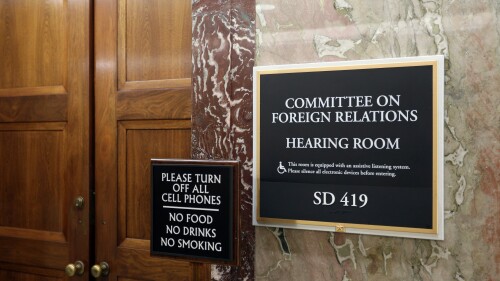Congress must move with urgency to pass new legislation that empowers the Secretary of the Treasury to strip the tax-exempt status from “terrorist supporting” nonprofit organizations. Terror-linked Islamist charities continue to thrive under the poorly-regulated American nonprofit system, and Senate Bill 4136 creates a legal framework to cripple their operations and shut down terror finance networks.
Last month, details stemming from a daring Israeli Defense Forces rescue operation showed that a reporter working for a U.S. nonprofit used his family home in Gaza to imprison at least three Israeli hostages kidnapped on October 7. Abdallah Aljamal, who was killed along with his wife and father in the June 8 raid, was not only a Hamas spokesman, but was also a “correspondent” for the tax-exempt Palestine Chronicle.
Terror-linked Islamist charities continue to thrive under the poorly-regulated American nonprofit system, and Senate Bill 4136 creates a legal framework to cripple their operations and shut down terror finance networks.
In response, the heads of three separate congressional committees called on Attorney General Merrick Garland last week to investigate and shut down this pro-Hamas publication. In the meantime, Palestine Chronicle continues hauling in those tax-free contributions – the lifeblood of 501(c)3 nonprofits.
Fortunately, there is a solution that would formalize procedures for abolishing Palestine Chronicle’s tax-free benefits. By passing S.4136, the Treasury Department can shut off the spigot of tax-deductible donor contributions to charities that may not be directly complicit in acts of terrorism or terror finance, but that otherwise lend support to terrorist movements.
With a companion bill that passed the House in April, S. 4136 amends the Internal Revenue Code, establishing a new category of “terrorist supporting organizations” with separate review and suspension procedures. Current law allows the government to permanently shut down charities explicitly listed as Specially Designated Global Terrorists (SDGTs) – something that has only happened nine times in U.S. history.
But what about the so-called charities and civic action groups that indirectly finance, endorse, or advocate on behalf of the most dangerous SDGTs in the world? Palestine Chronicle is hardly the only example.
According to Sam Westrop at Focus on Western Islamism, a terrorist patronage network infects the American 501(c) system. In November, Westrop identified $260 million funneled to Hamas-aligned nonprofits in the U.S., which use “charitable programs to expand and consolidate control over Muslim communities.”
This includes nonprofits such as Rahma Worldwide, a Michigan charity that proudly collaborated with a U.S.-designated terrorist organization in delivering aid to war-torn Gaza. While handing out humanitarian goods, Rahma workers were photographed in October wearing vests displaying the logo of the Islamic Heritage Revival Society, a prominent Hamas and Al Qaeda fundraiser.
In November, Sam Westrop identified $260 million funneled to Hamas-aligned nonprofits in the U.S., which use “charitable programs to expand and consolidate control over Muslim communities.”
Other U.S. nonprofits are less conspicuous in their support for terrorism, navigating legal gray areas by taking advantage of humanitarian exceptions to international sanctions, or by working with foreign schools, hospitals, and charities operating under the de facto control of terrorists.
In May, 135 organizations joined as signatories to a letter sent to the Senate Finance Committee denouncing S. 4136 as “dangerous and Orwellian.” They claim the bill is driven by “anti-Palestinian bias aimed at stifling voices advocating for Palestinian human rights.”
Ironically, many of these objecting groups could be the first to lose their tax-exempt privileges if the Senate’s bill is signed into law.
For starters, American Muslims for Palestine (AMP), an anti-Israel advocacy group that signed the letter, is facing investigations from both Congress and the Virginia Attorney General’s Office looking into allegations of money laundering and terror financing. Or how about the Mosque Foundation in Bridgeview, Illinois? This worship center in the heart of Chicago’s “Little Palestine” faced a years-long FBI probe and is considered a den for Muslim Brotherhood extremists. Two other nonprofits that signed the letter are unindicted co-conspirators in a 2007 Hamas-financing trial.
With their funding at risk, these groups argue that under the new bill, “an organization could potentially lose its tax-exempt status without facing criminal charges from the federal government.” Yet, this is precisely the point. Unindicted co-conspirators that escape prosecution but are credibly linked to terrorist groups deserve IRS attention.
The U.S. Constitution may protect speech – even the most heinous variety – but it does not guarantee a tax subsidy for any group or person. The IRS can refuse a tax exemption merely because a nonprofit is not educational. The agency has also shuttered charities for promoting hate, closing Bob Jones University in 1983 for banning interracial marriage, and denying the tax-exempt status to a neo-Nazi organization.
Of course, new laws are only helpful if they are enforced, and the past three presidential administrations have done very little to police domestic nonprofits involved with terrorism.
Islamists and their far-left allies aren’t alone in opposing the new counterterrorism bill. Some libertarians are concerned that the law could be used to weaponize the IRS, pointing to the Obama administration’s aggressive auditing of the Tea Party and other conservative groups. Reason Magazine cautioned that the bill would grant “unlimited power” to the government to slap the “‘terrorist supporting’” label on any nonprofit. “Only the secretary of the treasury could cancel that designation,” the article warned.
This is false. The Senate’s bill includes a multi-layer appeals process, or “opportunity to cure,” that starts with the Treasury secretary, moves to the IRS, and ends with a final ruling by a U.S. district judge. This is an improvement from the current tax code, which explicitly denies administrative and judicial review to terror-linked nonprofits.
Of course, new laws are only helpful if they are enforced, and the past three presidential administrations have done very little to police domestic nonprofits involved with terrorism. Perhaps this can be attributed to decades-long staff cuts at the IRS, or maybe authorities are reluctant to challenge litigious Muslim institutions that use civil rights as a cover for dismantling counterterrorism protections.
Whatever the case, it’s time for Americans to get serious about fighting terrorism – and that means taking down terrorists and their support networks.








